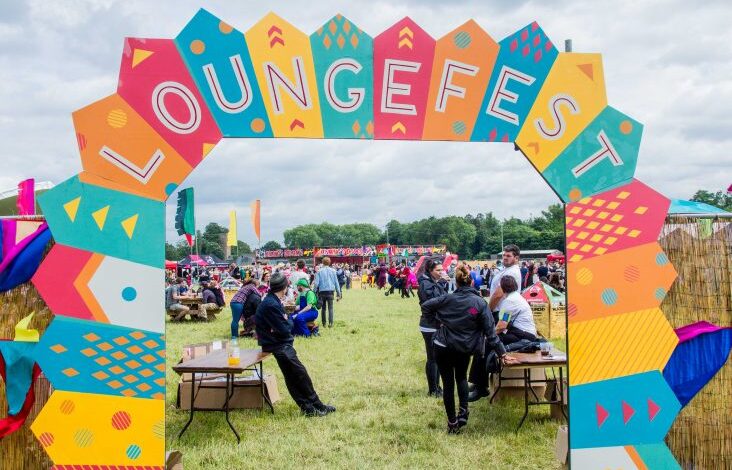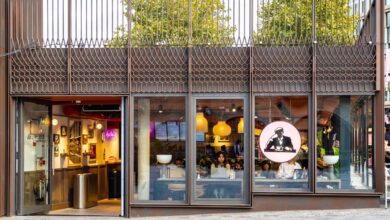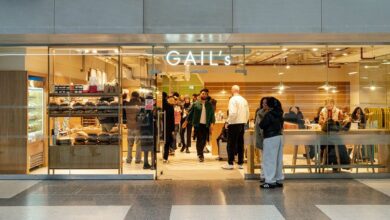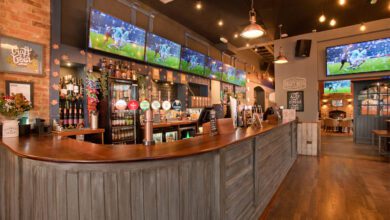Loungefest: the day hospitality pauses to party
When Loungers closed nearly 300 restaurants for 24 hours, it wasn’t for training or maintenance, it was to thank its 4,000-strong team with a full-scale festival. At a time when most operators are cutting back, this bold investment in people over profit offers a rare and revealing lesson in culture, loyalty, and leadership

Register to get 1 free article
Reveal the article below by registering for our email newsletter.
Want unlimited access? View Plans
Already have an account? Sign in
Ragley Hall was responsible for hosting “the biggest bash in hospitality” – Loungefest 2025 – earlier this month. By mid-morning, coaches carrying Lounge’s whole staff had begun arriving from Durham, Southampton, West Wales, and nearly every town in between. For all of Loungers’ people to participate, nearly 300 venues – every Lounge, Cosy Club, and Brightside – had to close for the day. Not for refurbishment, not for training, but for a party.
This year, over 4,000 team members stepped off those buses and onto the festival grounds. They were met by music stages, fairground rides, open bars, drag shows, lip sync battles, and enough street food to feed a small army. For one day, service was paused so celebration could begin. For the hospitality industry, something like Loungefest to ever occur is something close to unheard of.
Loungefest started small in 2013: just a few dozen team members in a rented field. Now it has grown into a full-scale event that some staff call “hospitality’s Glastonbury”. For Loungers, throwing a big bash for its staff has been described as an act of recognition of their hard work, as well as a nod to the group’s culture and the kind of personalities they aim to draw in.
“It’s so worthwhile closing all the sites for 24 hours,” says Nick Collins, chief executive of Loungers. “Watching thousands of our team members party together really brings home what we’ve created.”
In a sector known more for burnout than for benefits, Loungefest offers a rare alternative: a genuine thank you. At a time when hospitality businesses are cutting back, this hospitality operator is leaning in and betting that loyalty is built with more than wages.
The average operator is trying to stay afloat. Improving pay is a noble goal, but, as many in the industry will admit, it’s not always a feasible one.
Hospitality is running hot and cold at the moment. While there are signs that business is returning and footfall is rising, the fiscal changes applied to hospitality from last autumn’s budget are beginning to settle in, making many groups reconsider how much investment into brand growth and staff benefits they can handle.
New analysis of Office for National Statistics (ONS) data shows the accommodation and food services sector has the lowest hourly pay of any UK industry. In 2025, the average hospitality worker earns £12.39 an hour, just 18p above the National Living Wage. Most contracts average 26 hours a week, but staff routinely put in nearly three hours of unpaid overtime.
These numbers tell a familiar story. Post-pandemic debt, energy hikes and National Insurance changes have brought fresh pressure to the industry each year. The average operator is trying to stay afloat. Improving pay is a noble goal, but, as many in the industry will admit, it’s not always a feasible one. For many, this is where retention breaks down.
Where some other groups might still be chasing marginal gains and rethinking rota systems, Loungers has decided to build a reputation for its annual staff party. Loungefest began as a scrappy gathering in a field. A barbecue, a few crates of beer, and a handful of staff from the early Lounges. That was 2013. Over the span of 12 years, Loungefest’s guest list has grown from 50 to 4,000. What hasn’t changed, says Guy Youll, Loungers’ head of people, is the purpose.
“It’s always been about celebrating the incredible people who work for Loungers, from all walks of life. It’s our way of saying a huge thank you to the team for their hard work, and that’s remained constant every single year.”
The idea is simple: close the business for 24 hours, and show the team that they matter. However, if you’re looking at this from a numbers point of view, it doesn’t add up; sites are shut, income pauses and the company foots the entire bill for travel, staging, production, food and drinks, and security. Youll knows that that one day of the year makes no progress towards the wider group’s revenues and profit ambitions. At least, not directly.
“There is a commercial cost, of course,” Youll says. “But the real rationale is cultural. Our people often tell us that what makes Loungers special is who they work with. This is about giving them space to connect, celebrate, and relax with colleagues, outside of the pressure of service. It shows we care. And while there might not be a short-term profit, the long-term value is immense. It strengthens our team bonds, and it signals to current and future employees that we’re serious about our culture.”
More than 4,300 team members were transported to the Warwickshire estate from across the country. Loungers coordinates pickup points from nearly every corner of the UK. The return journeys begin just after sunset.
By the time the gates opened at Ragley Hall, the planning had been in motion for months. Every detail, from coach routes to drink tokens, had been mapped, approved, and tested. In other words, running Loungefest is a full-scale logistical operation in itself.
“It’s a huge undertaking,” Youll admits. “Internally, we handle all the communications, registration, and invites – which is a big job in itself. Then we partner with two key external companies: one that manages over 150 coaches needed to pick up people from around 250 locations, and another that takes care of the production – things like the stage, lighting, toilets, food and drink vendors, and security.”
More than 4,300 team members were transported to the Warwickshire estate from across the country. Loungers coordinates pickup points from nearly every corner of the UK. The return journeys begin just after sunset.
According to Youll, the site itself runs like a mid-size music festival but somehow “it all comes together”. There are performance stages, lighting rigs, catering stalls, security barriers, roaming entertainers. DJ sets roll into live bands, followed by drag performances and crowd-led karaoke. One of the biggest draws this year was a drag-hosted Lip Sync Battle that pulled in a crowd of over 500.
In the days after Loungefest, stories started to circulate: who wore what, which band was best, who won the Lip Sync Battle. In team WhatsApp groups and pre-shift huddles, it’s like the festival lives on.
“The feedback is always fantastic,” says Youll. “People love the music, the food, the fairground rides, the drinks, the fancy dress – but mostly they love just being with their mates without any of the usual service pressure.”
While clearly Loungefest plays a huge role in shaping Loungers’ culture, Youl says there are no hard metrics pinned to the yearly festival. The group doesn’t tie it to quarterly retention reports or recruitment KPIs, but the benefits, he says, are a no-brainer. “While we can’t always measure direct returns, the indirect effects are clear,” Youll explains. “Loungefest helps with morale, employee satisfaction, and word-of-mouth recruitment. We hear it in the feedback, and we see it in the energy afterwards.”
Photos and footage from the day are fed into recruitment campaigns. It’s a visual proof point that stands out from polished slogans and empty promises.
Loungers faces stiff competition not just from other hospitality brands, but also from sectors like retail, logistics, and warehousing, which may offer easier work and slightly better pay. Loungers’ unique offering lies in its culture, and Loungefest serves as a tangible manifestation of that culture.
“Word of mouth plays a huge role in how people hear about us,” Youll continues. “In the days after Loungefest, our teams are buzzing – and many of our new hires come through friends and family of existing staff. Loungefest gives them something unique to talk about.”
The festival is also central to how Loungers markets itself as an employer. Photos and footage from the day are fed into recruitment campaigns. It’s a visual proof point that stands out from polished slogans and empty promises.
“Of course, I wouldn’t want someone to join just for Loungefest, though maybe some do!” Youll admits. “Ideally, they see it as one of the many ways we invest in people. It helps us stand out from the more conventional restaurant and hospitality groups.”
While it could easily rationalise Loungefest with statistics on employee engagement or retention, it opts not to.
For too long, hospitality has focused solely on quantitative metrics when it comes to its people: labour percentages, turnover rates, and cost-per-hire. However, with increasing pressures, there’s a growing understanding that something more profound is essential to unify a workforce. Loungers exemplifies this. While it could easily rationalise Loungefest with statistics on employee engagement or retention, it opts not to. “Not every good idea shows ROI on a spreadsheet,” says Youll. “If we tried to justify Loungefest purely on commercial logic, we might never have done it. But instinctively, we knew it was right. And that instinct has paid off in ways that numbers can’t always capture.”
Plenty of operators may argue that now is not the time to take risks, that margins are too tight, that the focus has to stay on operations. But Loungers is showing that without staff, there are no operations. And if they don’t care about the larger business, they will up and leave. “There are plenty of companies doing great things, but fewer who are willing to take risks on initiatives that don’t come with obvious financial return,” Youll says. “For us, Loungefest is about being consistent in doing what’s right for our teams – even when it doesn’t show up in the bottom line.”
However, Youll cautions that that doesn’t mean every operator should throw a music festival. What it means is that the best HR strategy might not be a policy at all, but a moment that proves your values. “First, make sure it aligns with your culture,” Youll explains. “Loungefest works for us because we’re a bit anti-corporate and entrepreneurial. For another company, a black-tie dinner might be more appropriate. Listen to your team, don’t just make top-down decisions based on what leadership thinks is cool.”
On paper, Loungefest is a party: a field, a stage, a few thousand hospitality workers off the clock. But to those who attend – and to those watching from across the industry – it signals something rarer: a company willing to put culture before convenience.
Loungefest is not a cure for hospitality’s systemic issues. It won’t fix low wages or rewrite the industrial strategy. But it reminds the sector what’s possible when leadership trades caution for conviction, even just for one day a year. Because when you close 300 restaurants to say thank you, people notice. Especially the ones you’re thanking.







